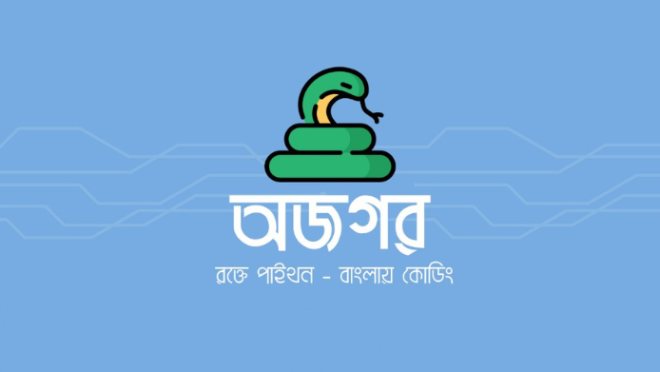Programming made easy: DIU student’s Ojogor introduces Bangla syntax to Python
Programming made easy: DIU student’s Ojogor introduces Bangla syntax to Python

In this modern era, having the knowledge of a programming language may prove to be the best skillset one can attain, yet acquiring such skills is not easy. Most people, when learning, the challenges of understanding certain logic as well as, for non-native English speakers, the syntax of such language may prove to be another layer of complexity.
To solve the language barrier and make programming widely accessible to everyone, Ratul Hasan Ruhan, a student of Daffodil International University, has introduced Ojogor, the Python language which exclusively uses Bangla syntax.
Motivation
Ruhan always shared a fascination with programming languages, and this led to him experimenting with various projects, one of which inspired him to undertake Ojogor. “One day I thought—why not make something in Bangla? Python is already beginner-friendly, but many people in Bangladesh struggle with English-based syntax,” said Ruhan.
The syntax used in Bangla is easy to grasp with short phrases for each command. A typical syntax in python looks like this,
number = 7
if number > 5:
print(“big number”)
else:
print(“small number”)
Whereas the same program in a Bangla syntax in Ojogor will look like,
যদি (সংখ্যা > ৫) {
দেখাও “সংখ্যা বড়!”
} না হলে {
দেখাও “সংখ্যা ছোট!”
}
In order to use Ojogor, the user does not need to install any Python compiler,
“The file extension of Ojogor is (.og). when the user writes code and the file is in .og format. It’s basically compiled based on a Python compiler. But users don’t need to install Python. the Ojogor setup file, I integrated all things,” explained Ruhan.
Challenges
The project was solely undertaken by his labour of love required much of it. Also, not all phrases in the Bangla language can be easily introduced within the syntax library. As Ruhan explained, “ Some programming terms don’t have direct Bangla translations, and even if they do, they often sound awkward. “
This complexity has led to some phrases sounding a bit weird yet funny. For instance, in order to “return” something, one has to type in Ojogor, “ফিরিয়ে দাও”
Ruhan has also developed a mobile application for beginners to use Ojogor without having the hassle of setting up their devices specifically needed for Python.
Future prospect
The world has long shifted to introducing programming languages in the school curriculum, and Ruhan also believes that his Ojogor has the simplicity and ease of learning to be used for educating young minds, and it is a good stepping stone for introducing students to the wider world of programming.
“Schools could use it to introduce coding to kids without the language barrier. Even for older learners, understanding logic is easier when they don’t have to struggle with English syntax first.”
Ruhan also believes localising other languages for natives can be achieved, and this opens up the possibility to make programming and overall computer literacy more accessible for non-native English speakers. Ruhan is finding his work quite appreciated amongst the learning community, and this is what is driving him to carry on helping add more features and functionalities to Ojogor.
He expressed that, “If it helps even one student overcome the language barrier and start coding, that’s a success for me.”


